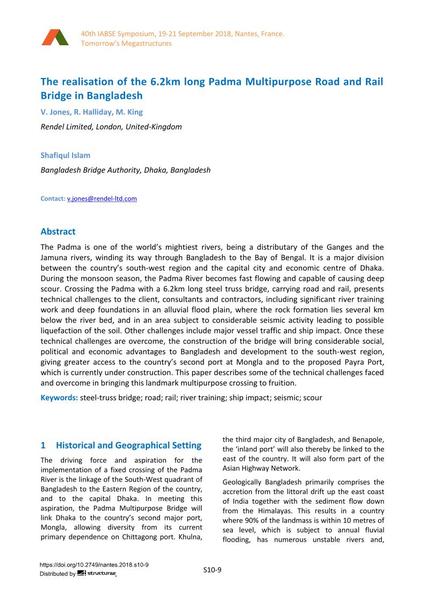The realisation of the 6.2km long Padma Multipurpose Road and Rail Bridge in Bangladesh

|
|
|||||||||||
Détails bibliographiques
| Auteur(s): |
V. Jones
(Rendel Limited, London, United-Kingdom)
R. Halliday (Rendel Limited, London, United-Kingdom) M. King (Rendel Limited, London, United-Kingdom) Shafiqul Islam (Bangladesh Bridge Authority, Dhaka, Bangladesh) |
||||
|---|---|---|---|---|---|
| Médium: | papier de conférence | ||||
| Langue(s): | anglais | ||||
| Conférence: | IABSE Symposium: Tomorrow’s Megastructures, Nantes, France, 19-21 September 2018 | ||||
| Publié dans: | IABSE Symposium Nantes 2018 | ||||
|
|||||
| Page(s): | S10-9 | ||||
| Nombre total de pages (du PDF): | 9 | ||||
| DOI: | 10.2749/nantes.2018.s10-9 | ||||
| Abstrait: |
The Padma is one of the world’s mightiest rivers, being a distributary of the Ganges and the Jamuna rivers, winding its way through Bangladesh to the Bay of Bengal. It is a major division between the country’s south-west region and the capital city and economic centre of Dhaka. During the monsoon season, the Padma River becomes fast flowing and capable of causing deep scour. Crossing the Padma with a 6.2km long steel truss bridge, carrying road and rail, presents technical challenges to the client, consultants and contractors, including significant river training work and deep foundations in an alluvial flood plain, where the rock formation lies several km below the river bed, and in an area subject to considerable seismic activity leading to possible liquefaction of the soil. Other challenges include major vessel traffic and ship impact. Once these technical challenges are overcome, the construction of the bridge will bring considerable social, political and economic advantages to Bangladesh and development to the south-west region, giving greater access to the country’s second port at Mongla and to the proposed Payra Port, which is currently under construction. This paper describes some of the technical challenges faced and overcome in bringing this landmark multipurpose crossing to fruition. |
||||
